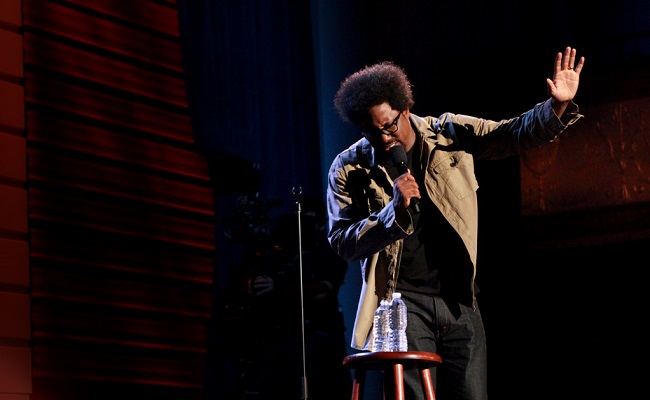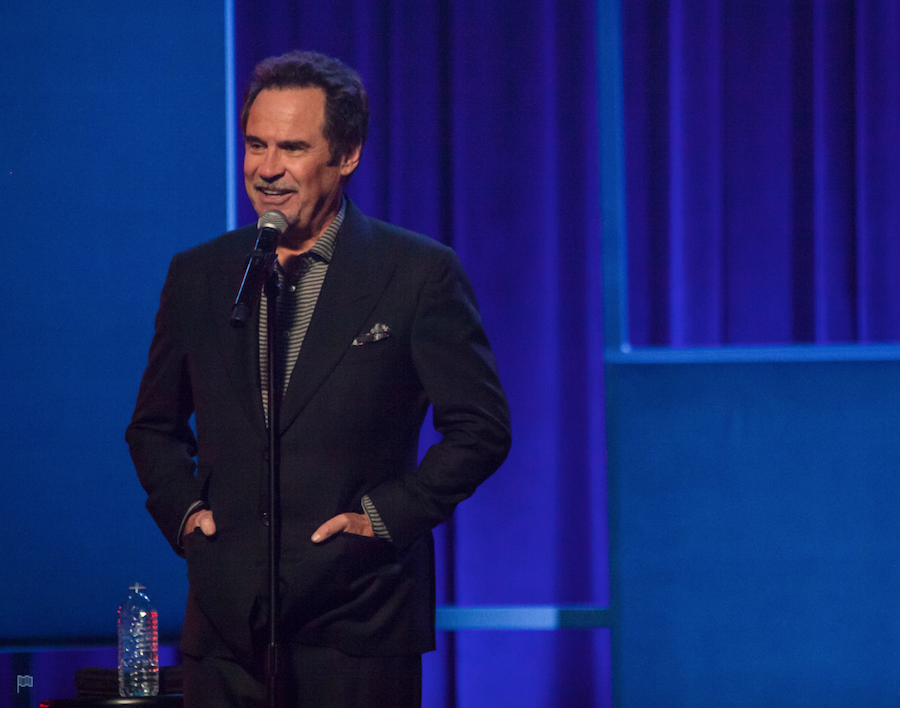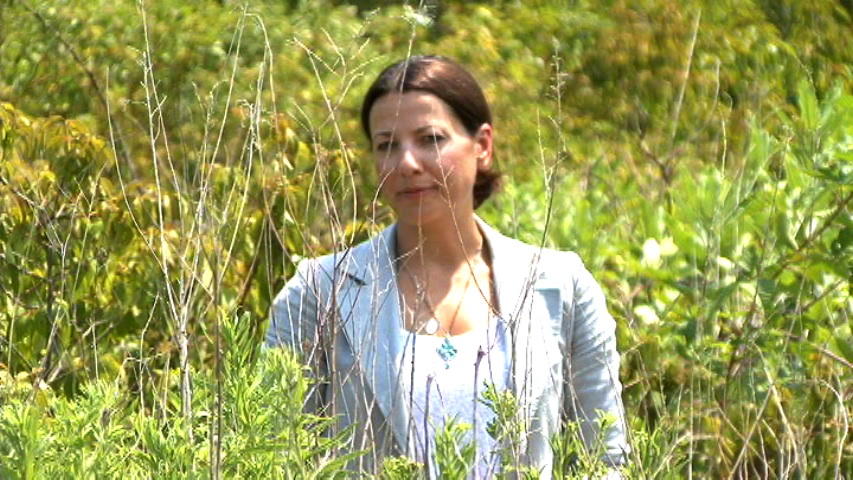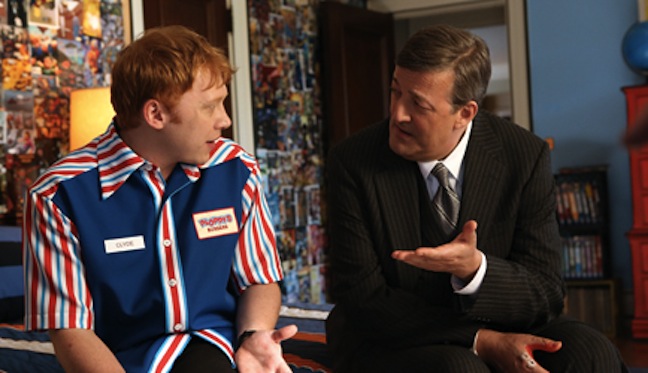W. Kamau Bell‘s second chance to make a big first impression on American audiences is off to a hot start.
Literally, figuratively, metaphorically.
His CNN series, United Shades of America, debuted Sunday night and closed the hour with the stand-up comedian standing face-to-hooded-face with a group of Ku Klux Klansmen as they set fire to a giant cross in the rural South. It was the Cable News Network’s highest-rated show of the night. Now Bell’s first hourlong stand-up special, Semi-Prominent Negro, premieres tonight on Showtime.
Both the series and the special place Bell in a more prominent light than his first regular opportunity on cable television, hosting the late-night talker Totally Biased with W. Kamau Bell weekly on FX, then as a short-lived nightly series on FXX.
Now that the fruits of his labors have reached a screen near you, a few words about them both.
United Shades opened this week with Bell on stage in his stand-up element, talking us through not only the hour we’re watching, but also how the series came to be in the first place. You see, he never imagined he’d actually meet the KKK where they live and try to recruit new white Christian members into their flock. Bell joked that he pitched the idea to CNN execs just to sound edgy and create a dialogue that he could negotiate down to, say, making hay of being a black guy at the rodeo.
But United Shades is not that kind of show. Nor is it even that kind of CNN show.
Whereas the History Channel sent Larry the Cable Guy across the country in search of unique Americana (Only in America, 2011-2013), and CNN attempted D.L. Hughley Breaks the News (2008-2009), this time, when CNN handed the reins to a stand-up comedian, it gave him enough slack to really tackle issues, one per hour, and give us a bigger, better picture of subcultures that make up our broader portrait of America.
In that respect, Bell shares more with new CNN colleague Anthony Bourdain, although United Shades is neither No Reservations nor Parts Unknown. And you get the sense right away that perhaps Bell should have had some reservations.
Driving down one-way roads through the woods deep into Arkansas and Kentucky, meeting KKK groups on their campgrounds and in their churches, these renegade racists politely greet Bell and his small camera crew. Even while calling him part of a “mud race” and worse.
In one small town, the natives tell Bell that the KKK and racists left long ago. A 20-something white guy sets him straight, though. They’re still down the road, actively spewing their hate. Everyone would rather just pretend they’re gone and forgotten.
Bell jokingly compares the KKK to MySpace in its outdatedness.
Confronted with them, especially in the dark, he’s much warier with his words. Here’s a clip.
In next Sunday’s episode of United Shades, Bell visits the California state prison at San Quentin.
The hours allow Bell to show off the aplomb he displayed in his man-on-the-street segments for Totally Biased, while also devoting more time to each subject without, one hopes, the reliance on ratings that his previous TV home demanded.
Another new CNN colleague, Morgan Spurlock, directed Bell’s first stand-up special that premieres tonight on Showtime.
Save for a Ben Carson reference or two, the hour couldn’t be more relevant now if Bell had tried.
An opening sketch finds Bell reading a bedtime story to his mixed-race daughter, amazingly on-point with this week’s headlines as he first suggests reading from “Moses: When Harriet Tubman Led Her People to Freedom,” before compromising with “The Autobiography of Malcolm X, as told to Alex Haley,” which itself opens with a tale about the KKK. “Skip to the white people in America!” his daughter yells from under the covers. Soon enough, it’s time to tuck her in and report for work, which he depicts as a half-block walk from brownstone to the Roulette theater in Brooklyn.
Though his actual time living in Brooklyn was brief, Bell can joke with authority about how even gentrification has its mini-generation gaps, as he discovered himself saying: “Oh man, I remember when that Chase Bank used to be a Washington Mutual.”
“What kind of nostalgia is that?” Trying to explain it to his daughter, he quickly realizes: “Your generation’s just gonna have to burn it down and start over because we ruined everything.”
Whether he’s in Brooklyn or Berkeley — or you’re in Portland or Austin, for that matter — Bell believes every big city needs to keep it weird. “Everyday you leave your house you should be like, ‘Oh, I’ve never seen that before!’ That’s what I like.” Weird is different and different is good, although a white lady at the bus stop eating red cabbage raw might be too weird? On the flip side, you don’t have to flip the channel too many times before you’re seeing reports about how small-town fears of weirdness are expressing themselves — not only in the extreme racism of white power Bell exposed in the first episode of his CNN series, but also the new transphobia manifesting itself into discrimination laws sweeping across the South.
But Bell also a funny and perfectly topical once more Alec Baldwin reference (Baldwin just got a new TV gig yesterday!) to illustrate how New York City liberalism differs in a more muscular offensive way than what he experiences living in the Bay Area. “I can’t quit you Alec Baldwin, no matter how many weird things you say. Maybe Tina Fey should write your conversations, too.”
The way strangers react to Bell’s mixed-race daughter, which also means how they react to Bell’s white wife, fascinates the comedian. Anyone suggesting he’s not keeping it 100 hasn’t done the math like he has.
https://youtu.be/tzKldU5jEsI
And you just may find yourself Googling “Chocolate Hair Vanilla Care,” although I’ve saved you the trouble.
As Bell’s two daughters grow up, he’s not only realizing how pre-school indoctrinates us into capitalism — trapping the small children for eight hours at a time with people they may not like — but also how children compare to empty MacBook Airs that require regular software updates to fill their hardware with new information. He realizes, in that moment, how senior citizens must not get the updates any longer at some point, and that’s what results in the looks on their “spinning beach ball face” as they fail to keep up with the times. “And that’s how you get a Republican.”
Bell also recalls how, during his own childhood, his mother wondered when he’d grow out of enjoying episodes of The Dukes of Hazzard, (spoiler alert: it took a black talking car to do the trick).
Bell thinks of himself now as “semi-prominent” only because reporters will ask him to field questions on behalf of his entire race when they cannot find a more prominent black celebrity to weigh in with a quote.
The most ludicrous of those questions seems to come from white reporters wondering when they can utter racial slurs. Bell’s immediate answer is more than sufficient. Although you probably could get away with saying the word once Bell can get away with selling those pillows with his face on them. Only he’s not ready for that voodoo just yet. After all, he’s still only semi-prominent. For now.
United Shades of America airs Sunday nights at 10 p.m. Eastern/Pacific on CNN.




